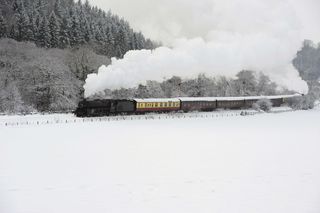The Kalashnikov Paradox
 The sight of a steam train storming through the snow in Yorkshire's North Riding didn't just fill me with a warm glow of memory. It evoked a thought (below) and a particular recollection, of something I am fairly sure that I saw aged four, namely the last run of the old Princetown railway, on a wintry March Saturday in 1956.
The sight of a steam train storming through the snow in Yorkshire's North Riding didn't just fill me with a warm glow of memory. It evoked a thought (below) and a particular recollection, of something I am fairly sure that I saw aged four, namely the last run of the old Princetown railway, on a wintry March Saturday in 1956.
Can the engine have been blue as it went sadly through the hamlet of Dousland where we then lived, on its last journey? I don't think so, in fact all experience suggests a sooty black was more likely - but memory, that lying jade, insists it was blue. The line (much of my childhood seems to have been spent near or riding on now-defunct railway lines) ran up from Yelverton to the top of Dartmoor and was the only link between Dartmoor Prison and the outside world if the snow came down hard and the roads became impassable - though in one really bad blizzard it had once been closed. My father pointed out, as we watched the final train chuff by, that one day they'd wish they'd kept it open. Though of course helicopters can always make the journey in an emergency, so perhaps they haven't. I don't suppose my father, born before 1914, had completely adapted to the idea of helicopters by 1956.
I now learn that heavy old filthy old steam locomotives can easily conquer snowy conditions, whereas modern electric and diesel engines, being too light and too dependent on sensitive computers which don't like the cold, will shut down.
This comes as no surprise. Steam will work when almost everything else doesn't. When I lived in Moscow, I visited a vast park full of enormous black steam engines, each with a red star painted on its smokebox, waiting to be recalled to service when the great day came. The park's existence had until recently been a secret. The thinking behind this was fascinating. All motorised transport, and even aircraft, would be knocked out by the Electro-Magnetic Pulse (EMP) from nuclear weapons. The only machines which would continue to function were steam engines and bicycles. So the Soviet Army had maintained a reserve of steam engines, ready to roll westwards in case there was no other way of invading Germany. This would have run into trouble in Poland, the only non-Russian country which in those days had lines built to the wider Russian gauge. But I suppose the construction battalions could have done a high-speed widening job on Western tracks if necessary.
But maybe they just kept them anyway, in case of something turning up. Most people know the old joke about the US space programme spending millions of dollars developing a ballpoint pen that would write in orbit, in weightless conditions - whereas the Soviet solution was to give their cosmonauts pencils. I don't know if it's true, but it expresses a truth.
 Most Soviet equipment was extremely crude. But it was also easy to mass produce, wasn't made to tiny tolerances, didn't depend on high levels of maintenance, or on temperate and dry conditions. That's why, if a conventional Third World War had ever been held, the USSR would probably have won. NATO planes would have been grounded by drizzle. Soviet MiGs would have flown in all weathers in huge numbers. NATO tanks, with their superb fire control, would have suffered ceaseless computer glitches. Soviet tanks, crude and simple, would have lumbered on regardless and kept shooting. Etc etc.
Most Soviet equipment was extremely crude. But it was also easy to mass produce, wasn't made to tiny tolerances, didn't depend on high levels of maintenance, or on temperate and dry conditions. That's why, if a conventional Third World War had ever been held, the USSR would probably have won. NATO planes would have been grounded by drizzle. Soviet MiGs would have flown in all weathers in huge numbers. NATO tanks, with their superb fire control, would have suffered ceaseless computer glitches. Soviet tanks, crude and simple, would have lumbered on regardless and kept shooting. Etc etc.
And of course the Kalashnikov AK-47 weapon would have carried on firing when everything else had jammed. The AK-47 is the absolute proof of the contention that simple, crude, reliable devices are often more use than over-engineered, needlessly complex ones. American soldiers have been known to throw their own M16 weapons away and to swap them for Kalashnikovs, and it is easy to see why. Does this have any implications for the way in which we design and build such things as railways, now?
If you want to comment on Peter Hitchens, click on Comments and scroll down.
Peter Hitchens's Blog
- Peter Hitchens's profile
- 296 followers



